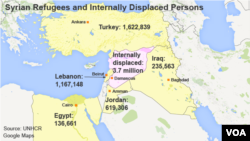Syrian President Bashar al-Assad said his government receives information about U.S.-led airstrikes against Islamic State militants in Syria, but he stressed there is no direct cooperation.
Assad told the BBC in Damascus that there are exchanges of messages through third parties, such as Iraq, but the exchanges do not include tactical information.
He said Syria would not join the U.S.-led coalition.
"No, definitely we cannot and we don't have the will and we don't want, for one simple reason: because we cannot be [in] alliance with the country who support the terrorism," Assad said.
The Syrian government has long described forces opposed to Assad as "terrorists" along with groups like the Islamic State and the al-Qaida-linked Nusra Front.
Assad said most of the countries in the coalition support terrorism.
Denies barrel bomb allegations
He also asserted that Syrian forces have not used barrel bombs or other indiscriminate weapons during the country's nearly four-year civil war, saying they have "bombs, missiles and bullets," but not barrel bombs.
"This is [a] childish story that keeps repeating in the West," Assad said.
Amnesty International, Human Rights Watch and a United Nations panel reporting on the human rights situation in Syria have all accused Syrian forces of attacking populated areas with barrel bombs.
The U.N. said in an August report that Syrian forces rely on "heavily destructive firepower" and indiscriminate attacks that include the bombs to terrorize civilians.
Assad called any war a "bad war" that will have civilian casualties. But he said it would be "impossible" for the Syrian people to still support him if his forces attacked them.
"If we were the one who killed our people, as they say, how could we withstand four years while the people are against us supposedly?" he asked.
The Syrian president also said the army has not shelled schools.
The U.N.'s commission of inquiry on Syria detailed multiple attacks against schools in its latest report, including Syrian airstrikes against some sites that had been converted into shelters for people displaced within the country. The report also blamed opposition fighters for some attacks that hit schools.
Beginning of unrest
Assad disagreed with the description of the conflict beginning in March 2011 as a series of peaceful protests against his rule, saying the demonstrations were not in fact peaceful, citing the deaths of police at protest locations.
Security forces cracked down on the protests, and the crisis spiraled into a civil war that has killed more than 200,000 people.
As of Tuesday, the United Nations had registered more than 3.7 million refugees who fled to Turkey, Lebanon, Jordan, Iraq and Egypt. The U.N. estimates another 7.6 million people have been forced from their homes within Syria, half of them children.
Assad said he is affected by all those killed, whether they are opposition fighters or his own forces.
"It's something we live every day with in pain," he said.
International attempts to end the fighting, including two rounds of U.N.-brokered peace talks, have brought little progress.
In a strongly worded response to the interview, British Foreign Secretary Philip Hammond called the leader's characterizations "deluded."
"Assad’s forces have systematically murdered, tortured, raped and imprisoned Syrians. There can be no doubt that he is the problem, not part of the solution," Hammond said.
"The UK’s position has not changed, we have no dialogue with Assad; there must be a political transition to a future in which Assad has no part," he added.


